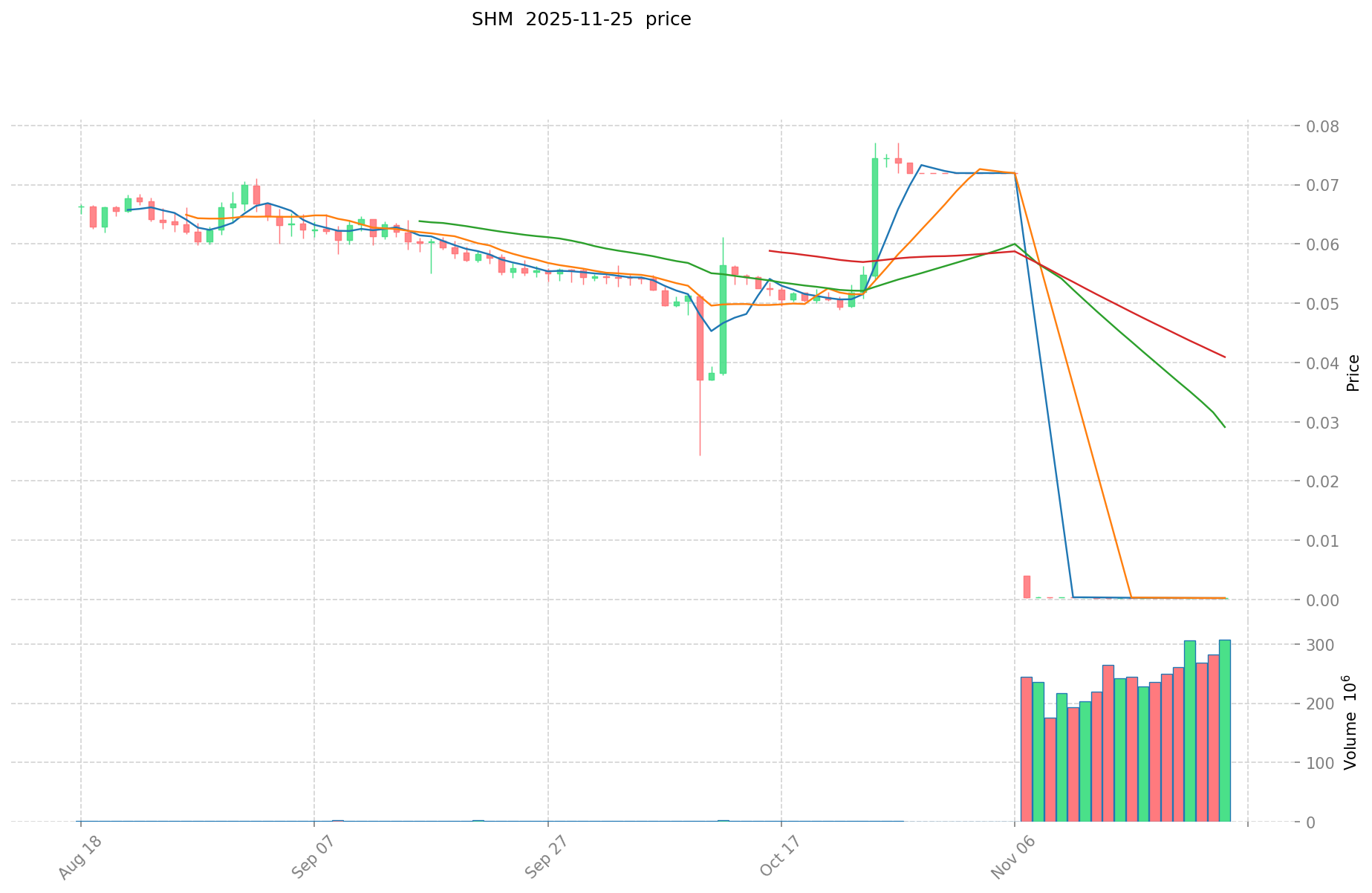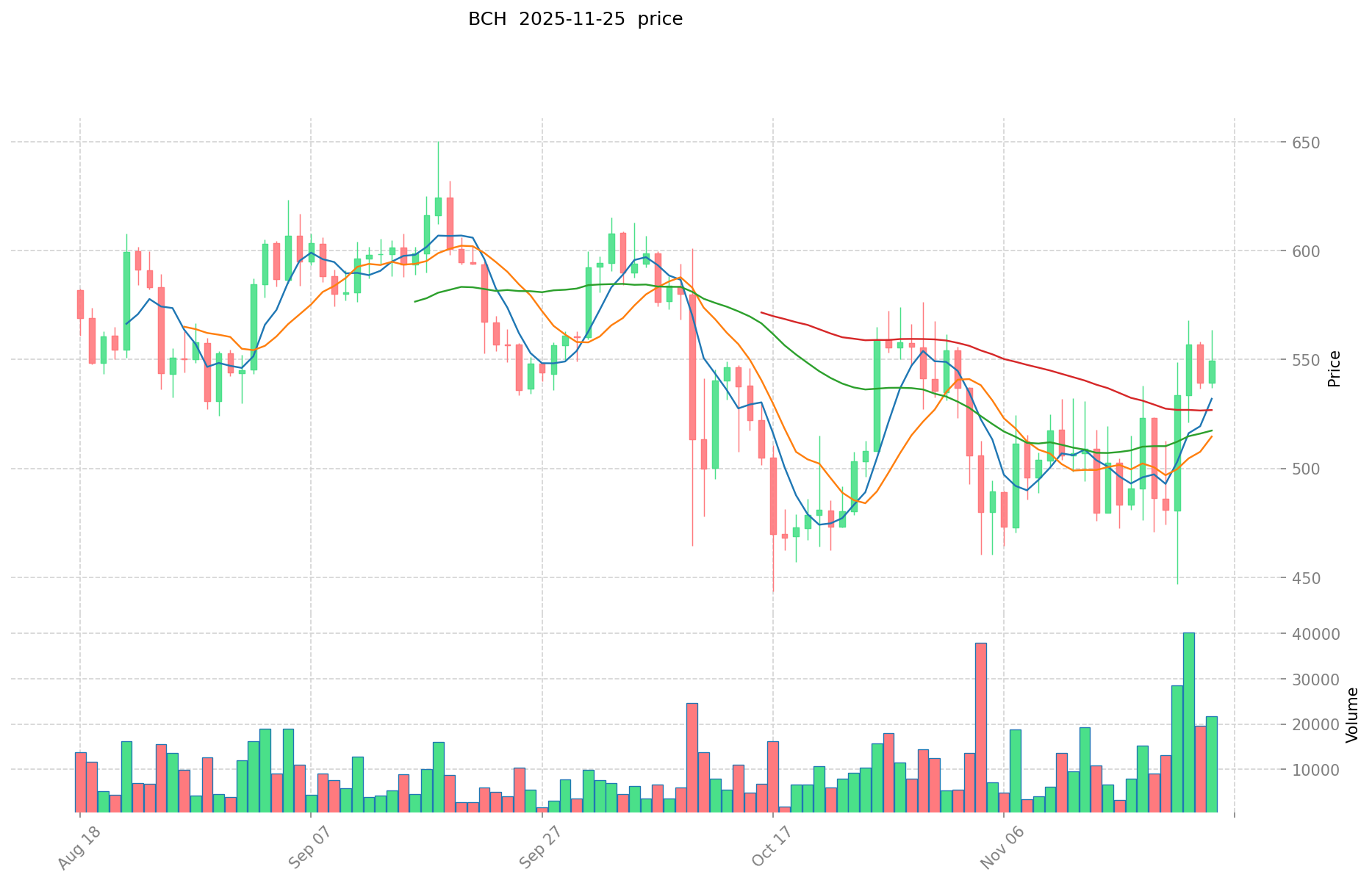SHM vs BCH: Comparing Two Cryptocurrency Giants in the Digital Asset Market
Introduction: SHM vs BCH Investment Comparison
In the cryptocurrency market, Shardeum vs Bitcoin Cash comparison has always been an unavoidable topic for investors. The two not only have significant differences in market cap ranking, application scenarios, and price performance, but also represent different cryptocurrency positioning.
Shardeum (SHM): Since its launch, it has gained market recognition for its auto-scaling layer-1 blockchain design aimed at solving scalability challenges while maintaining decentralization.
Bitcoin Cash (BCH): Since its inception in 2017, it has been hailed as a continuation of Satoshi's vision for global adoption, focusing on on-chain scaling and lower transaction fees.
This article will comprehensively analyze the investment value comparison between SHM and BCH, focusing on historical price trends, supply mechanisms, institutional adoption, technological ecosystems, and future predictions, and attempt to answer the question investors are most concerned about:
"Which is the better buy right now?"
I. Price History Comparison and Current Market Status
SHM (Shardeum) and BCH (Bitcoin Cash) Historical Price Trends
- 2025: SHM reached its all-time high of $0.65 on May 8, 2025, but has since experienced a significant decline.
- 2017: BCH was created through a hard fork of Bitcoin, with its price peaking at $4,300.04 in December 2017.
- Comparative analysis: In the recent market cycle, SHM dropped from its all-time high of $0.65 to a low of $0.0001893, while BCH has shown more stability, currently trading at $546.06.
Current Market Situation (2025-11-25)
- SHM current price: $0.0002249
- BCH current price: $546.06
- 24-hour trading volume: SHM $69,596.95 vs BCH $12,070,064.75
- Market Sentiment Index (Fear & Greed Index): 19 (Extreme Fear)
Click to view real-time prices:
- View SHM current price Market Price
- View BCH current price Market Price


Investment Value Analysis: SHM vs BCH Core Factors
Supply Mechanism Comparison (Tokenomics)
- SHM: Value primarily driven by airdrop activities and trading volume in spot and contract markets
- BCH: Fixed supply with focus on transaction efficiency through increased block size (up to 32MB)
- 📌 Historical pattern: BCH has shown significant price volatility, from hundreds to nearly $4,000 in 2017, followed by declines in 2022
Institutional Adoption & Market Applications
- Institutional holdings: BCH has established presence in the market since 2017
- Enterprise adoption: BCH positions itself as "electronic cash" with emphasis on small payment transactions and lower fees
- Regulatory stance: Both require monitoring of regulatory changes as they impact valuation
Technical Development & Ecosystem Building
- SHM: Limited technical information in the reference material
- BCH technical development: Implemented "smart contract" functionality in 2021, expanding beyond payment applications
- Ecosystem comparison: BCH faces competition from Ethereum (ETH) in smart contracts and from Litecoin (LTC) in low-fee transactions
Macroeconomic Factors & Market Cycles
- Inflation environment performance: Digital assets like BCH saw increased interest during COVID-19 as potential hedge against risk
- Macroeconomic policy impact: Global economic uncertainties and market sentiment fluctuations affect price performance
- Cross-border considerations: BCH aims to provide efficient transaction experience even during network congestion
III. 2025-2030 Price Prediction: SHM vs BCH
Short-term Prediction (2025)
- SHM: Conservative $0.00016164 - $0.0002245 | Optimistic $0.0002245 - $0.00033226
- BCH: Conservative $386.8861 - $544.91 | Optimistic $544.91 - $686.5866
Mid-term Prediction (2027)
- SHM may enter a growth phase, with prices expected in the range of $0.00018247809 - $0.00045459454
- BCH may enter a steady growth phase, with prices expected in the range of $544.3214972 - $870.91439552
- Key drivers: Institutional capital inflow, ETF, ecosystem development
Long-term Prediction (2030)
- SHM: Base scenario $0.000537973581376 - $0.000763922485553 | Optimistic scenario $0.000763922485553+
- BCH: Base scenario $1023.296238093792 - $1146.09178666504704 | Optimistic scenario $1146.09178666504704+
Disclaimer: This analysis is based on historical data and market projections. Cryptocurrency markets are highly volatile and unpredictable. This information should not be considered as financial advice. Always conduct your own research before making investment decisions.
SHM:
| 年份 | 预测最高价 | 预测平均价格 | 预测最低价 | 涨跌幅 |
|---|---|---|---|---|
| 2025 | 0.00033226 | 0.0002245 | 0.00016164 | 0 |
| 2026 | 0.000361894 | 0.00027838 | 0.0002700286 | 23 |
| 2027 | 0.00045459454 | 0.000320137 | 0.00018247809 | 42 |
| 2028 | 0.0005733013396 | 0.00038736577 | 0.0003602501661 | 72 |
| 2029 | 0.000595613607952 | 0.0004803335548 | 0.000278593461784 | 113 |
| 2030 | 0.000763922485553 | 0.000537973581376 | 0.000312024677198 | 138 |
BCH:
| 年份 | 预测最高价 | 预测平均价格 | 预测最低价 | 涨跌幅 |
|---|---|---|---|---|
| 2025 | 686.5866 | 544.91 | 386.8861 | 0 |
| 2026 | 665.008164 | 615.7483 | 486.441157 | 12 |
| 2027 | 870.91439552 | 640.378232 | 544.3214972 | 17 |
| 2028 | 1088.1306918144 | 755.64631376 | 566.73473532 | 38 |
| 2029 | 1124.703973400384 | 921.8885027872 | 497.819791505088 | 68 |
| 2030 | 1146.09178666504704 | 1023.296238093792 | 818.6369904750336 | 87 |
IV. Investment Strategy Comparison: SHM vs BCH
Long-term vs Short-term Investment Strategies
- SHM: Suitable for investors focused on scalability solutions and ecosystem potential
- BCH: Suitable for investors seeking established networks with payment use cases
Risk Management and Asset Allocation
- Conservative investors: SHM: 10% vs BCH: 90%
- Aggressive investors: SHM: 30% vs BCH: 70%
- Hedging tools: Stablecoin allocation, options, cross-currency portfolios
V. Potential Risk Comparison
Market Risks
- SHM: High volatility, limited trading history
- BCH: Competition from other payment-focused cryptocurrencies
Technical Risks
- SHM: Scalability, network stability
- BCH: Mining centralization, security vulnerabilities
Regulatory Risks
- Global regulatory policies may impact both differently, with established cryptocurrencies like BCH potentially facing more scrutiny
VI. Conclusion: Which Is the Better Buy?
📌 Investment Value Summary:
- SHM advantages: Auto-scaling layer-1 blockchain design, potential for growth
- BCH advantages: Established network, focus on transaction efficiency, smart contract functionality
✅ Investment Advice:
- New investors: Consider a small allocation to BCH for exposure to established cryptocurrencies
- Experienced investors: Balanced approach with both SHM and BCH based on risk tolerance
- Institutional investors: Primarily BCH with potential small allocation to SHM for diversification
⚠️ Risk Warning: Cryptocurrency markets are highly volatile. This article does not constitute investment advice. None
VII. FAQ
Q1: What are the main differences between SHM and BCH? A: SHM is an auto-scaling layer-1 blockchain focused on solving scalability issues, while BCH is a fork of Bitcoin aimed at improving transaction efficiency with larger block sizes. BCH has a longer history and established market presence, while SHM is newer with potential for growth.
Q2: Which cryptocurrency has shown better price stability? A: Based on the provided information, BCH has shown more price stability compared to SHM. BCH is currently trading at $546.06, while SHM has experienced a significant decline from its all-time high of $0.65 to $0.0002249.
Q3: How do the supply mechanisms of SHM and BCH differ? A: SHM's value is primarily driven by airdrop activities and trading volume in spot and contract markets. BCH, on the other hand, has a fixed supply and focuses on transaction efficiency through increased block size (up to 32MB).
Q4: What are the key factors influencing the future price predictions for SHM and BCH? A: Key factors include institutional capital inflow, potential ETF approvals, ecosystem development, macroeconomic conditions, and regulatory changes. These factors are expected to impact both cryptocurrencies, potentially driving their prices in the short, mid, and long term.
Q5: How do the investment strategies for SHM and BCH differ? A: SHM is more suitable for investors interested in scalability solutions and ecosystem potential, while BCH is better for those seeking established networks with payment use cases. Conservative investors might allocate more to BCH (90%) than SHM (10%), while aggressive investors might consider a 70% BCH to 30% SHM split.
Q6: What are the main risks associated with investing in SHM and BCH? A: For SHM, risks include high volatility, limited trading history, and potential scalability and network stability issues. BCH faces risks from competition with other payment-focused cryptocurrencies, mining centralization, and potential security vulnerabilities. Both are subject to regulatory risks, with BCH potentially facing more scrutiny due to its established status.
Share
Content